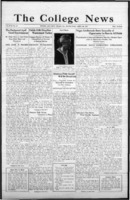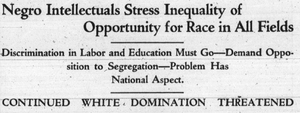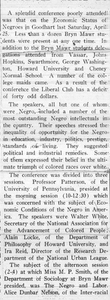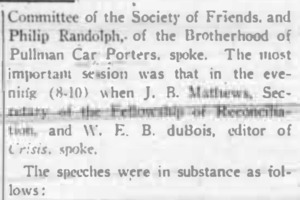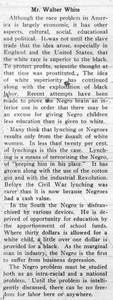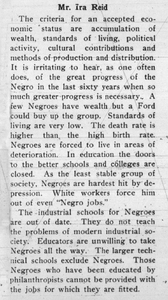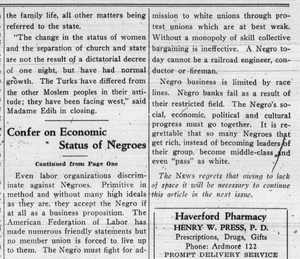Negro Intellectuals Stress Inequality of Opportunity for Race in All Fields
Dublin Core
Title
Negro Intellectuals Stress Inequality of Opportunity for Race in All Fields
Subject
Bryn Mawr College
Description
The "Negro Intellectuals Stress Inequality of Opportunity for Race in All Fields" article describes the poor attendance of the 1931 conference hosted by Bryn Mawr. The article lists the schools that attended and the notable speakers along with their talking points from the conference.
Source
The College News, 1931-04-29, Vol.17, No.20
Publisher
Bryn Mawr College
Date
1931-04-29
Contributor
This item has been edited from its original form for clarity by the '24 '31 Students Study Race team.
Rights
Item courtesy Bryn Mawr College Special Collections
Language
English
Type
Text
Identifier
0000426.jp2
Coverage
Bryn Mawr, PA
1931
1931
Text Item Type Metadata
Text
Negro Intellectuals Stress Inequality of Opportunity for Race in All Fields
Discrimination in Labor and Education Must Go - Demand Opposition to Segregation - Problem Has National Aspect.
CONTINUED WHITE DOMINATION THREATENED
A splendid conference poorly attended was that on the Economic Status of Negroes in Goodhart last Saturday, April 25. Less than a dozen Bryn Mawr students were present at any one time. In addition to the Bryn Mawr students delegations attended from Vassar, Johns Hopkins, Swarthmore, George Washington, Howard University and Cheney Normal School. A number of the college maids came. As a result of the conference the Liberal Club has a deficit of forty odd dollars.
The speakers, all but one of whom were Negro, included a number of the most outstanding Negro intellectuals in the country. Their speeches stressed the inequality of opportunity for the Negro in education, industry, politics, prestige, standards of living. They suggested political and industrial remedies. Some of them expressed their belief in the ultimate triumph of colored races over white.
The conference was divided into three sessions. Professor Patterson, of the University of Pennsylvania, presided at the morning session (10-12:30) which was concerned with the subject of Economic Conditions of the Negro in America. The speakers were Walter White, Secretary of the National Association for the Advancement of Colored People; Alain Locke, of the Department of Philosophy of Howard University, and Ira Reid, Director of the Research Department of the National Urban League.
The subject of the afternoon session (2-4) at which Miss M. P. Smith, of the Department of Sociology at Bryn Mawr presided, was The Negro and Labor. Alice Dunbar Nelson, of the Inter-racial Committee of the Society of Friends, and Philip Randolph, of the Brotherhood of Pullman Car Porters, spoke. The most important session was that in the evening (8-10) when J.B. Matthews, Secretary of the Fellowship of Reconciliation, and W.E.B. duBois [sic], editor of Crisis, spoke. The speeches were in substance as follows:
Mr. Walter White
Although the race problem in America is largely economic, it has other aspects, cultural, social, educational and political. It was not until the slave trade that the idea arose, especially in England and the United States, that the white race is superior to the black. To protect profits, scientific thought at that time was prostituted. The idea of white superiority has continued along with the exploitation of black labor. Recent attempts have been made to prove the Negro brain an inferior one in order that there may be an excuse for giving Negro children less education than is given to white.Many think that lynching of Negroes results only from the assault of white women. In less than twenty per cent, of lynchings is this case. Lynching is a means of terrorizing the Negro, of "keeping him in his place." It has grown along with the use of the cotton gin and with the industrial Revolution. Before the Civil War lynching was rarer than it is now because Negroes had a cash value.
In the South the Negro is disfrachised by various devices. He is deprived of opportunity for education by the apportionment of school funds. Where thirty dollars is allowed for a white child, a little over one dollar is provided for a black. As the marginal man in industry, the Negro is the first to suffer from business depression. The Negro problem must be studied both as an intra-racial and a national problem. Until the problem is intelligently discussed, there can be no freedom for labor here or anywhere.
Mr. Ira Reid
The criteria for an accepted economic status are accumulation of wealth, standards of living, political activity, cultural contributions and methods of production and distribution. It is irritating to hear, as one often does, of the great progress of the Negro in the last sixty years when so much greater progress is necessary. A few Negroes have wealth but a Ford could buy up the group. Standards of living are very low. The death rate is higher than the high birth rate. Negroes are forced to live in areas of deterioration. In education the doors to the better schools and colleges are closed. As the least stable group of society, Negroes are hardest hit by depression. White workers force him out of even "Negro jobs."The industrial schools for Negroes are out of date. They do not teach the problems of modern industrial society. Educators are unwilling to take Negroes all the way. The larger technical schools exclude Negroes. Those Negroes who have been educated by philanthropists cannot be provided with the jobs for which they are fitted.
Even labor organizations discriminate against Negroes. Primitive in method and without many high ideals as they are, they accept the Negro if at all as a business proposition. The American Federation of Labor has made numerous friendly statements but no member union is forced to live up to them. The Negro must fight for admission to white unions through protest unions which are at best weak. Without a monopoly og skill collective bargaining is ineffective. A Negro today cannot be a railroad engineer, conductor or fireman.
Negro business is limited by race lines. Negro banks fail as a result of their restricted field. The Negro's social, economic, political and cultural progress must go together. It is regrettable that so many Negroes that get rich, instead of becoming leaders of their group, become middle-class and even "pass" as white.
The News regrets that owing to lack of space it will be necessary to continue this article in the next issue.
Original Format
Paper
Files
Reference
1931, Negro Intellectuals Stress Inequality of Opportunity for Race in All Fields, Bryn Mawr College
